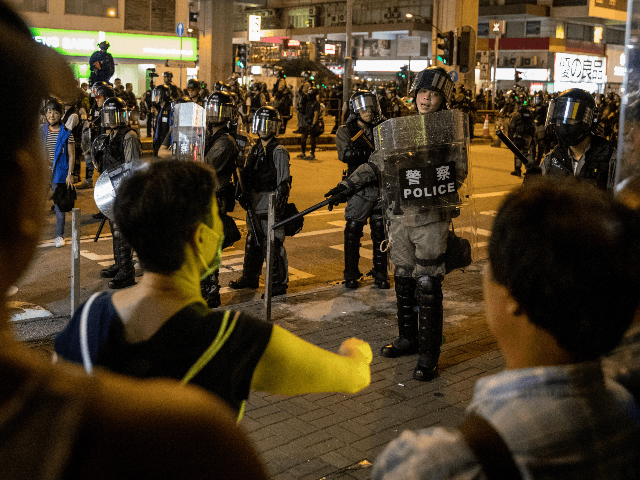Hong Kong police on Wednesday arrested several people demonstrating outside the police station in Mong Kok, where demonstrations have been occurring nightly since a controversially forceful August 31 raid on a railway station.
The Hong Kong Free Press reported that police were not pleased by efforts to monitor their activities in Mong Kok:
Ming Pao reported that a 13-year-old girl was among those detained. When an onlooker tried to ask her name, a police officer interjected and said that the onlooker was not a lawyer.
As arrests were being made, some officers shone head-mounted strobe lights at reporters trying to record the scene.
The pace of protest marches is not slowing down, reflecting the determination of protesters to have all five of their core demands met, not just permanent withdrawal of the extradition bill that sparked the current political crisis:
Though the bill has been withdrawn, demonstrators are demanding a fully independent probe into police behavior, amnesty for those arrested, universal suffrage and a halt to the characterization of protests as “riots.”
More protests have been planned throughout the week, including a rally at 8pm on Friday at Chater Garden in Central against alleged police brutality at the San Uk Ling Holding Centre. Meanwhile, an “anti-Chinazi” march will be held on Sunday at 2:30pm – protesters plan to march from Sogo department store in Causeway Bay to government headquarters in Admiralty. The organizers have said they will not seek police approval.
A good deal of emphasis in the protests is moving to police brutality and the need for a proper investigation, not just an internal review that would be dismissed as a whitewash.
Elderly protester Chan Ki-kau, part of a group of “grandpas” that tries to protect young demonstrators from harm, said in a radio interview on Wednesday that he was pepper-sprayed and shoved to the ground without warning on Saturday night merely because he asked the name of a young demonstrator arrested by the police.
“Nowadays the police would use false pretenses, and protect those officers who knowingly break the law,” Chan said.
Chan added that he was not the old man in a yellow vest who was dragged into an alley and kicked by police officers in a viral video from the weekend, but said the man was another member of his Protect Our Kids Campaign.
The South China Morning Post on Wednesday reported Chinese authorities appear to have convinced themselves the true cause of the uprising is expensive Hong Kong real estate, which causes young people to feel nervous about their futures even though the semi-autonomous city has extremely low unemployment rates.
Some of the protesters do complain about unaffordable housing, and occasionally blame it on Chinese real estate speculators as well as local development cabals, but the notion of dissipating political unrest with housing subsidies did not have many takers.
The SCMP’s interviews with young protesters suggested resentment against the Beijing-controlled government of Hong Kong was much deeper than previously understood and the extradition bill served to focus that resentment into mass political action. The youth of Hong Kong was said to have grown increasingly demoralized as Chinese domination loomed and their unique civic identity slipped away.
“Without genuine, universal suffrage, we won’t get a leader who will really carry out policies that benefit the people. Problems such as high property prices will only persist,” said one protester who had good reason to complain about Hong Kong’s lousy housing market, having spent her entire 32 years on Earth in a 300-square-foot apartment with her parents.
All of the protesters interviewed by the SCMP described universal suffrage and true representative democracy as the key demand of the movement because all other promises could easily be broken in the future by the current undemocratic system.
Former U.S. ambassador to Singapore Kirk Wagar told CNBC on Wednesday that Beijing has “no good options in Hong Kong” because Chinese Communist Party chief Xi Jinping long ago made an unwise decision to deliberately “devalue” the city to “teach a lesson to the rest of China.”
Wagar expressed pleasant surprise that China has not cracked down on the Hong Kong protest movement yet, but saw little chance that the remaining four core demands of the protesters will be met, especially that all-important call for universal suffrage.

COMMENTS
Please let us know if you're having issues with commenting.